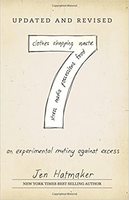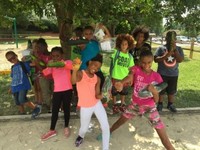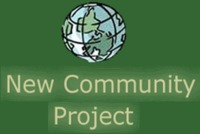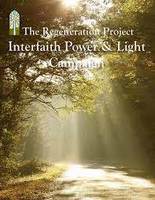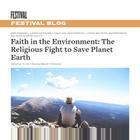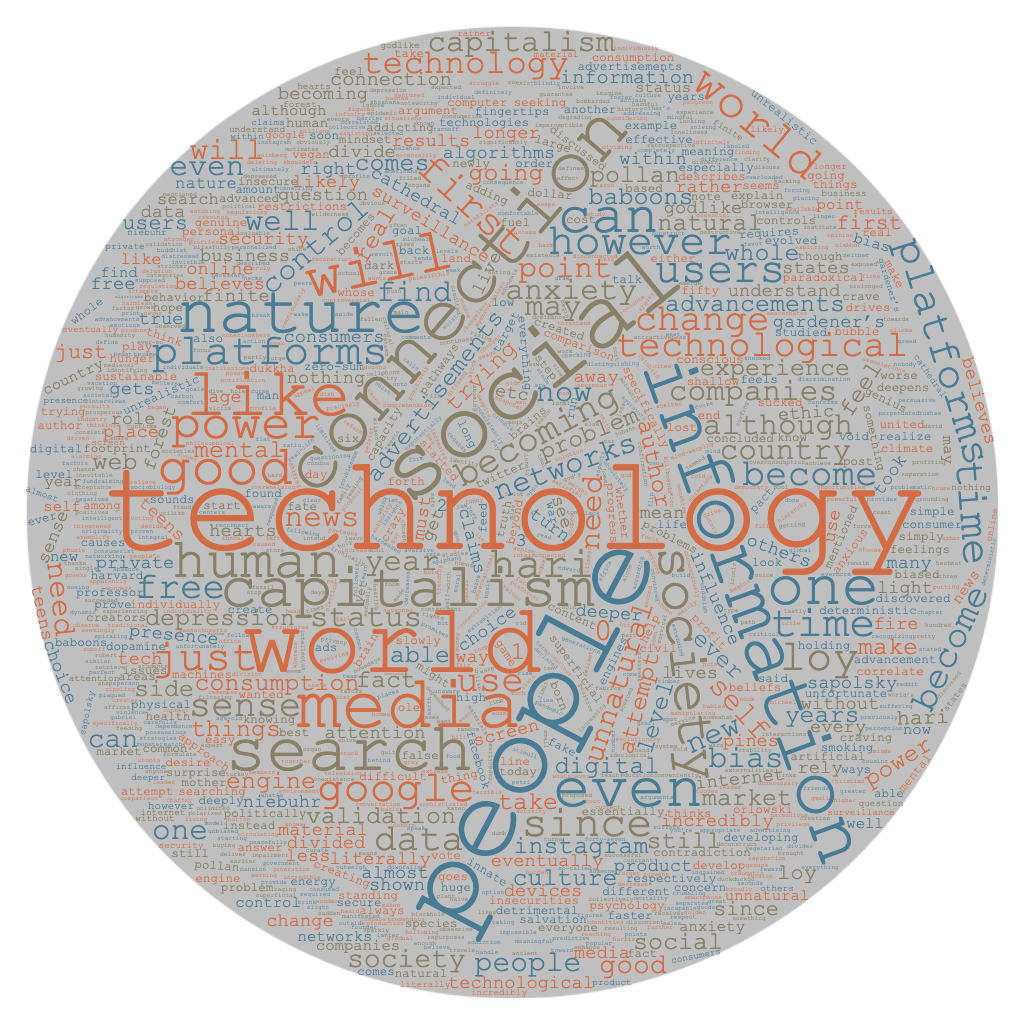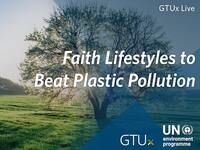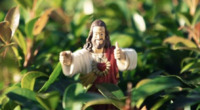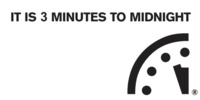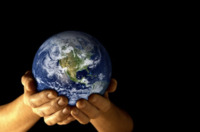Search
109 items
-
7: An Experimental Mutiny Against Excess
Overwhelmed by the excess in her own life, Jen Hatmaker and her family set out on a project they called “Seven.” Highlighting seven areas of excess, they committed to living a little more simply every month. Originally published in 2011 and updated in 2017, 7 has been utilized for book studies in many Christian faith communities. For those overwhelmed with the task of implementing creation care in their own lives, Hatmaker’s memoir tells of her family’s practical and faith inspired experiment. More information about Hatmaker’s project can be found on her blog. -
Saving Buffalo Reef
This 11-minute video, by the Great Lakes Indian Fish & Wildlife Commission (GLIFWC), informs the viewer of the natural, cultural, and economic importance of Buffalo Reef. This reef is located off the Keweenaw Peninsula, Michigan, in Lake Superior. Buffalo Reef is currently under ecological distress due to local mining activities. Current Tribal, State, Federal, and Academic efforts are underway to help restore this significant environmental feature, as documented in this video. -
Columbus YMCA Youth Engage in 4-H Urban Gardening Program for Cultural Exchange with Youth in Accra, Ghana
This summer, dozens of Columbus North YMCA youth participated in 4-H urban gardening programs as part of an urban agriculture exchange program with 4-H and YMCA youth from Accra, Ghana. In response, in May of 2017, three Ghanaian youth and an advisor will travel to Columbus to share their urban agriculture experiences at the annual Ohio Future Farmers of America (FFA) conference at the Ohio State Fairgrounds. Please click the link below to read more: -
Dalai Lama Espouses Sustainability in Business
His Holiness the Dalai Lama recently spoke in Brussels to promote global responsibility in business and economics for the sake of social and environmental sustainability. His appearance was coordinated with the recent publication of Business as an Instrument for Societal Change: In Conversation with the Dalai Lama (https://www.routledge.com/go/greenleaf-publishing), a book by Sander Tideman. For more information about the Dalai Lama’s teachings on the environment, visit his website and browse his list of environmental speeches and messages (https://www.dalailama.com/messages/environment). -
6 Ways to Green Your Holiday
6 Ways to Green Your Holiday is a graphic made by the Sierra Club. It gives 6 easy ways make Christmas traditions more sustainable. To view the image, click below or *download* -
Care for Creation Check List
This Care for Creation Check List is a conversation created by the nonprofit organization New Community Project. The Care for Creation Check List is meant to be read between two people or performed as a skit. One person reads the Genesis creation account while another person uses the list to gauge how other species are doing during the Age of Humans. -
Creation Care Hack: Train Yourself to use Reusable Shopping Bags
Creation Care Hack: Train Yourself to use Reusable Shopping Bag is a post from Evangelical Environmental Network MOMS. The article discusses how using a reusable shopping bag is only easy if you make it a habit, which can be difficult. It then gives a few tips on how to make this sustainable practice a habit. The article also has a graphic on how plastic bags are killing the planet, which can be found below. The author finishes by saying, “If the 70% of Americans who identify as Christians practiced using less disposable plastic bags what a witness and difference that could make.” See additional attached media for an infographic (.jpg) for visual information on plastic bag use. -
The Regeneration Project
The Regeneration Project was created as the parent project of Interfaith Power&Light. It is meant to help deepen the connection between ecology and faith and to help people of faith recognize and fulfill their responsibility for the stewardship of creation. They do so through educational programs for clergy and congregations -
12 Days of Christmas Recycling
12 Days of Christmas Recycling is an article from Evangelical Environmental Network about all the “stuff” that accumulates over Christmas. December is the highest month for landfill deposits with household waste increasing by 25% between Thanksgiving and Christmas. An average of 30 million Christmas Trees will end up in landfills and 4 million tons of wrapping paper and gift bags will be used. The article gives 12 ways to “reduce the overuse” and to move the focus of Christmas back to the birth of Jesus. -
Catholic Climate Covenant Earth Day Video
Catholic Climate Covenant has created their 2018 Earth Day video Beyond a Throwaway Culture. The focus of the video is the harm that comes from single-use disposable plastics - how it contributes to both land and marine pollution. -
Faith in the Environment: The Religious Fight to Save Planet Earth
An article discussing the interfaith panel “Ways of Knowing, Ways of Living: Exploring Faith and Conservation” at the 2022 Smithsonian Folklife Festival. The author introduces the four panelists, their faiths, and their respective perspectives on encouraging intersections of faith and environmentalism, with Imam Saffet Abid Catovic representing Muslim faith, Jakir Manela representing Jewish faith, Michael Nephew representing Native American faiths, and Dr. Rachel Lamb representing (Evangelical) Christian faith. -
Technological Takeover or Technological Makeover?
This chapter from the student-written book “Emerging Perspectives on Religion and Environmental Values in America” explores the recent and rapid development of technology and its impact on our environmental actions. It discusses trends of consumerism, social conflict, and disconnection. Below is the first paragraph of the chapter to introduce the discussion.
"Is it just me or does it feel like the whole world is going crazy? From a global pandemic, to a civil rights revolt, to talk about election fraud, it seems like everything is spiraling out of control and technology seems to be adding fuel to the fire. It feels as if technology is the invisible hand that controls us all on every level, individually and as a culture. As technological advancements push further, the concern for the problems perpetuated by them rises as well. I am not trying to be labeled as a 'Karen' of my generation, but technology is slowly eating away at our brains and degrading the fabrics that hold our society together." -
The Great Global Cleanup
This toolkit is intended to help guide people and groups on how to start and execute a cleanup project to restore communities.
"Follow our simple guide to make the most out of your cleanup. If you need any help, reach out to us at info@earthday.org." -
3000-year-old solutions to modern problems | Lyla June | TEDxKC
"In this profoundly hopeful talk, Diné musician, scholar, and cultural historian Lyla June outlines a series of timeless human success stories focusing on Native American food and land management techniques and strategies. Lyla June is an Indigenous musician, scholar and community organizer of Diné (Navajo), Tsétsêhéstâhese (Cheyenne) and European lineages. Her dynamic, multi-genre presentation style has engaged audiences across the globe towards personal, collective and ecological healing. She blends studies in Human Ecology at Stanford, graduate work in Indigenous Pedagogy, and the traditional worldview she grew up with to inform her music, perspectives and solutions. Her current doctoral research focuses on Indigenous food systems revitalization. This talk was given at a TEDx event using the TED conference format but independently organized by a local community." -
Sustainability Photo Contest
This RESTORExchange photo contest is being brought back from the pre-COVID era, and with an added collaboration with the Sustainability Institute. It's based around the question "What does sustainability look like?" This can include sustainability in environmental justice, technology, energy, lifestyle and wellbeing, society and culture, economy and politics, and any other context where you see sustainability in action. We want to see your perspectives and show all the different places that sustainability is practiced! Winning photos will be decided by a panel of judges (yet to be determined), and the top four photos will win a prize! First place will receive $400, second place will receive $300, third place will receive $200, and an honorable mention will receive $100. Submissions will be accepted through March 15, 2023. -
Faith Lifestyles to Beat Plastic Pollution
"Dr. Iyad Abumoghli and Sarah Berg, Acting Director for the Center for Climate Justice and Faith at Pacific Lutheran Theological Seminary, discuss the ways in which faith communities are uniquely positioned to combat the climate crisis.
This GTUx Lecture will specifically focus on actions that can be taken to combat plastic pollution — an area in which faith-based organizations are positioned to be significant catalyzers through educating, activating and inspiring their communities; developing capacity for sustainable practices; advocating policymakers and mobilizing the private sector; and collaborating with their community partners to advance change." -
Marianist Environmental Education Center
"The Marianist Environmental Education Center (MEEC) is an environmental education community in the Catholic tradition. In Mary's hope-filled spirit, we preserve and act in communion with the land and educate other communities in sustainability through ecology-based simple living, social justice and spirituality." -
Cool Congregations
"The Cool Congregations Challenge, is an annual national contest to recognize 'Cool Congregations' that are becoming energy efficient and sustainable role models within their communities. The contest is brought to you by Interfaith Power & Light, a nonprofit organization inspiring and mobilizing people of faith and conscience to take bold and just action on climate. There are no fees to enter. Application period opens November 1 each year. Deadline for entries, December 15. Get ready to enter the Challenge!
Due to Covid the project eligibility window has been expanded again for 2024. Projects completed in 2021, 2022, and 2023 will be eligible to apply. Deadline Dec 15, 2023, awards announced in February 2024.
NEW! Electric Vehicle Leader category for congregations that have encouraged EV adoption. This category includes: EVs (Congregants and Staff) • Congregational EV Charging Stations • Outreach • Educating and Advocating for EVs. (Includes all-electric vehicles, plug-in hybrids and electric bikes. If your congregation is working on reducing transportation emission through public transportation or carpooling, apply to the Community Inspiration category.)" -
Advent Simplicity Challenge
"This Advent, commit to simplicity. In a season that can mistakenly be focused on gifts and consumption, explore ways to live simply as we hopefully prepare for the coming of Jesus and the restoration of the earth. This year, we’ll be mixing in new daily challenges, as well as accompanying PDFs for folks who prefer not to use the interactive calendar." -
Evolution of the Collective Unconscious
"The collective unconscious is made up of experiential knowledge, symbols, and imagery that humans are naturally born with (no tabula rasa) and are rooted in ancestral experience and shared by all persons in all cultures. After millennia of evolution, the current collective unconscious of humanity would seem to include human exceptionalism, patriarchal hegemony, short-terminism, delusions of grandeur, illusions of unending growth, and the idolatry of technology. As the planet becomes overloaded with industrial civilization, our collective mindset seems to be unwilling to think long-term and face the realities of ecological overshoot. It remains to be seen whether our collective mindset can evolve to voluntarily refocus human agency toward contraction of the human enterprise, simplification of lifestyles, and peaceful resolution of conflicts before it is too late to prevent a chaotic collapse of industrial civilization." -
Plastic Jesus: Real Faith in a Synthetic World
"Everywhere we look in our culture you will find plastic. One place where you will not find plastic, however, is in the Bible.
This resource is designed to help congregations think more deeply about the ways that plastics impact our lives and God's creation. It is also intended to equip people of faith to take actions to address this epidemic in faithful and practical ways.
Download this resource to find stories of individuals and communities making a positive impact, sermon starters to spark meaningful discussions in your church, worship resources to unite in prayer and reflection, and actionable steps to address the plastic crisis in your life, community and, our world." -
Why Conservative Christians Don’t Believe in Climate Change
"American Christians have become increasingly polarized on issues of climate change and environmental regulation. In recent years, mainline Protestant denominations and the Roman Catholic Church have made explicit declarations of support for global climate action. Prominent Southern Baptists and other evangelical Protestants, on the other hand, have issued statements that are strikingly similar to the talking points of secular climate skeptics, and have attempted to stamp out 'green' efforts within their own ranks. An analysis of resolutions and campaigns by evangelicals over the past 40 years shows that anti-environmentalism within conservative Christianity stems from fears that 'stewardship' of God's creation is drifting toward
neo-pagan nature worship, and from apocalyptic beliefs about 'end times' that make it pointless to worry about global warming. As the climate crisis deepens, the moral authority of Christian leaders and organizations may play a decisive role in swaying public policy toward (or away from) action to mitigate global warming." -
Taoist monks find new role as environmentalists
This article details the efforts of Taoist leaders in China to incorporate sustainability in Taoist temples and promote a culture of environmentalism. Since 2006, the Daoist Ecological Protection Network has gained the support of 120 temples who have converted to the use of solar panels and biofuels. Taoist monks noticed many people to be ignorant towards their environmental impact, living a life of hyper-materialism. Monks wanted to help educate society about the actions that can be taken to ameliorate environmental issues both at the temples and in daily life. This pursuit is driven by a fundamental belief in Taoism to live in harmony with nature, a value that could have large impacts on society if adopted. -
Turning Around Our Relationship with Earth is a Teshuvah Project
The author recounts an unsettling encounter with a utility worker who downplayed the environmental harm of her gas leak. From here, she explains the true negative impacts of methane emissions on both people and the climate, and encourages us to act in a way that "turns around our relationship with Earth". She connects this with the Jewish tradition of Teshuvah, the time in between Rosh Hashanah and Yom Kuppur meant for repentance. -
Al-Mizan: Covenant for the Earth
"The Covenant presents an Islamic outlook on the environment in a bid to strengthen local, regional, and international actions to combat the triple planetary crises defined by the United Nations as climate change, biodiversity loss and pollution. It is a global endeavour to engage Muslims from all levels of society in the development and adoption of this call...
Al-Mizan - A Covenant for the Earth is a restatement of the principles governing the protection of nature in a form that meets current challenges. It examines the ethics behind the social patterning of human existence and enquires into how they could be brought to life today working in harmony with the heartbeat of the natural world."

